LONDON: Saddled with a bankrupt economy, a devastated infrastructure and a worthless currency, the regime of Syrian President Bashar Assad is on a desperate mission to mend relations with its neighbors and expedite its return to the Arab League.
Although political rehabilitation on a global scale remains a bridge too far, the Assad government has made some progress in rebuilding its ties with Arab states, as evidenced by the reopening of some embassies in Damascus and the return of Syrian ambassadors to some Arab capitals.
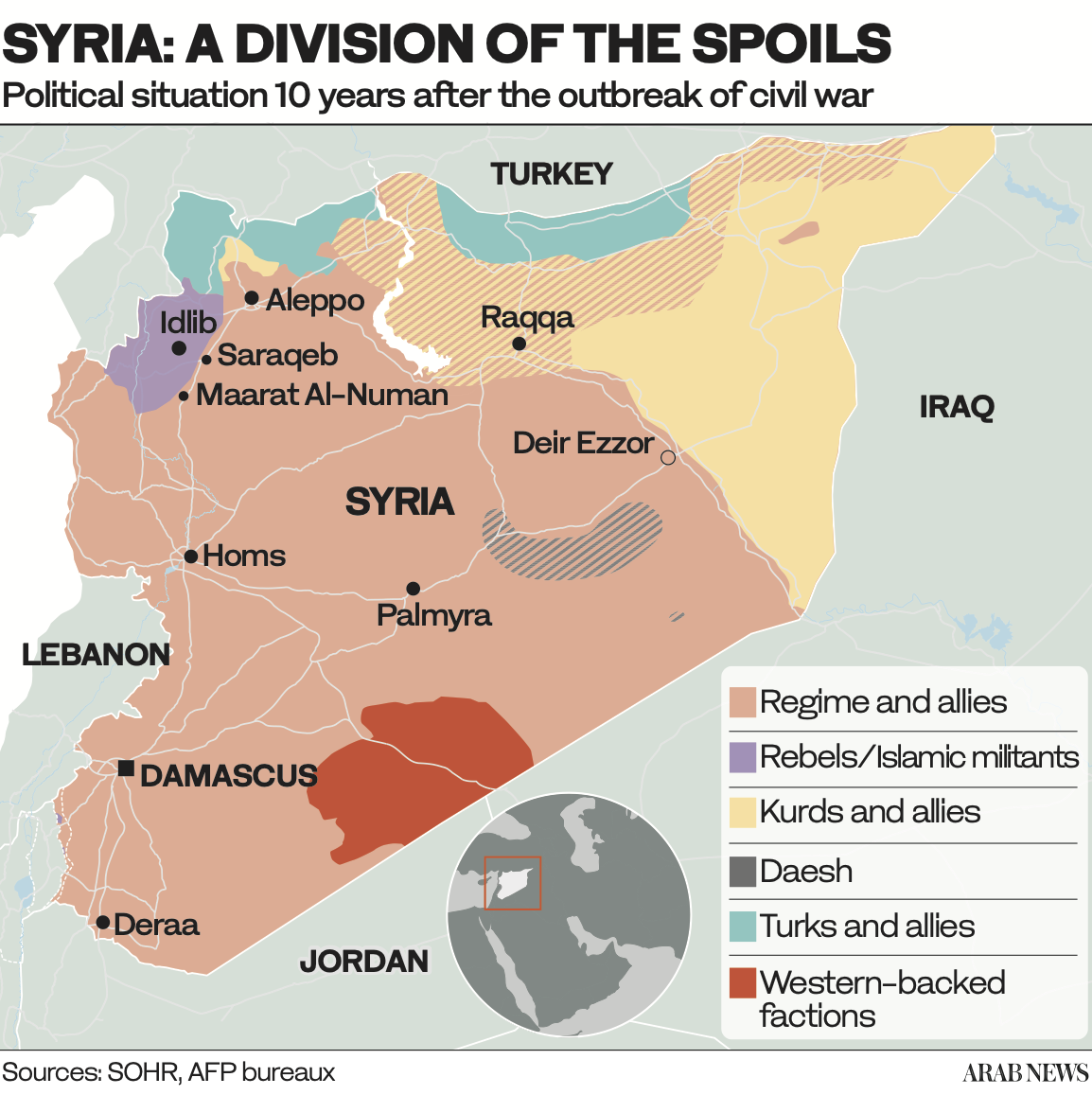
With active conflict easing across large swaths of Syria — remaining rebel factions are confined to isolated holdouts in the far south and northwest — the regime has increasingly turned to tourism in an attempt to whitewash its well-documented crimes against humanity.
In recent months, Western travel bloggers and YouTubers have flocked to regime-held areas of Syria in record numbers in search of images and testimonies they believe offer a candid, agenda-free look inside the outcast dictatorship.
Content of this kind, which includes videos that in some cases have amassed more than 2.5 million views, is often presented as a perspective on the “Syria that the media won’t show,” as Benjamin Rich, a British vlogger who goes by the YouTube user name “Bald and Bankrupt,” put it in a recent upload.
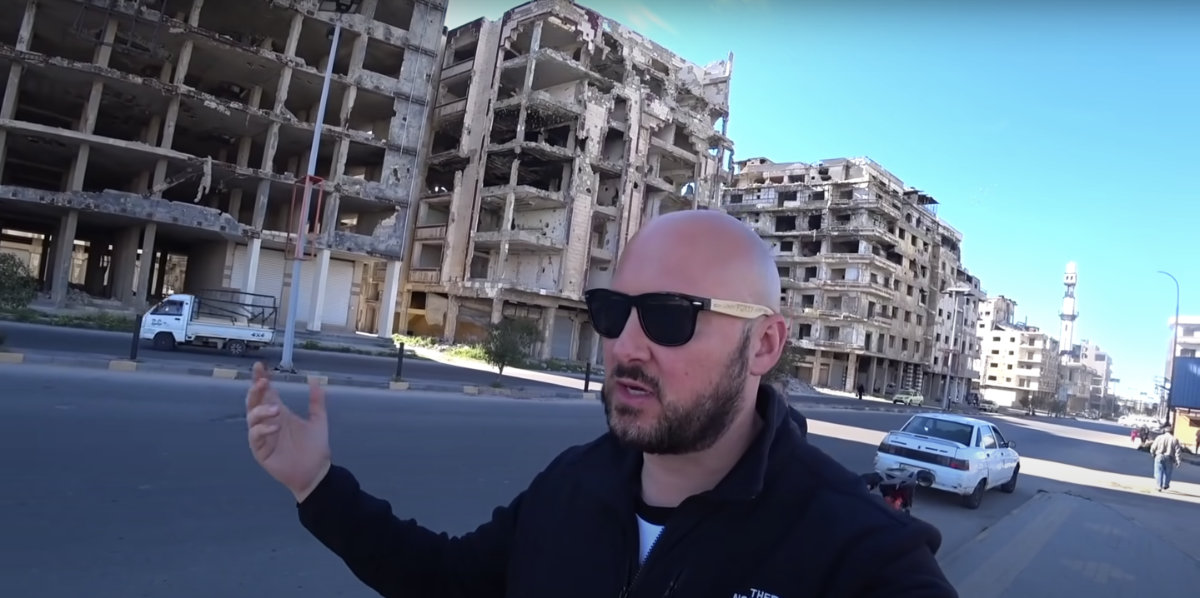
Benjamin Rich (‘Bald and Bankrupt’) filming destroyed buildings in Homs. (Supplied)
But human-rights monitors and experts are concerned that this rise of “war tourism” projects a sanitized version of reality that serves the regime’s disinformation campaign about Syria now being safe for refugees to return and resume their normal lives.
“Travel bloggers are perhaps the best advertising the Syrian government has had in over a decade,” Simon Bayley, the lead Syria analyst at the Center for Operational Analysis and Research, told Arab News.
“They tell only stories that the government would tell, gloss over the crimes of the state, and neglect realities that the government would consider best ignored. There can be no accountability, only more denial, control and marginalization of the many millions of Syrians to have lost loved ones, homes and livelihoods as a result of the regime’s actions.”
In several videos, bloggers appear keen to emphasize a sense of security and normality in Syria, for example by stressing how “perfectly safe” they feel, as YouTube user “Backpacker Ben” stated in one of his videos. “We were walking around, drinking beers on the street, talking to people,” he said.
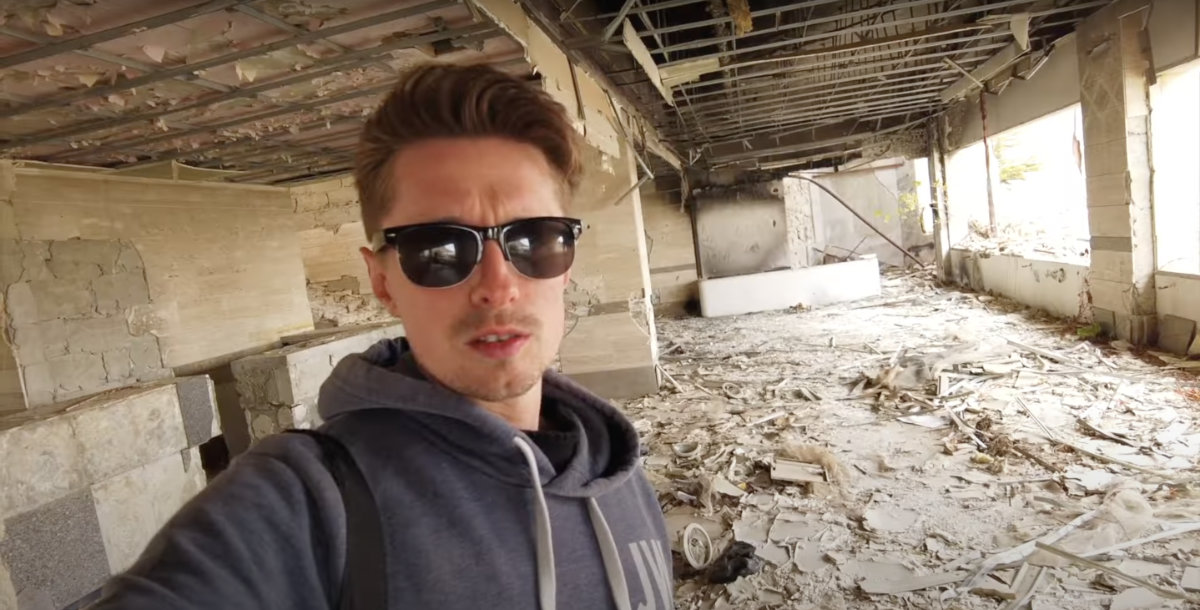
‘Backpacker Ben’ filming a destroyed rebel stronghold in Maaloula, in rural Damascus. (Supplied)
But the Syria Justice and Accountability Center, a human rights organization based in Washington, D.C., warned that the content uploaded by travel bloggers creates a false impression of stability and security.
“Syria is clearly not safe for the return of refugees,” Mohammed Al-Abdallah, the center’s executive director, told Arab News. “But, if you watch these videos, you see a Syria that is safe, stable and, in some ways, prospering.”
The videos also appear to suggest the conflict in the country is largely over and life is returning to normal.
“Syrians who return to Syria don’t have those same experiences and often face intense suspicion and persecution by the Syrian government,” said Al-Abdallah.
According to human rights monitors, including the European Asylum Support Office, the Syrian regime continues to arrest, detain, interrogate, torture and kill returnees, despite many of them obtaining security clearances and status settlement before returning to Syria.

“For millions of Syrians, returning to Syria is not an option,” Laila Kiki, the executive director of rights-monitoring group The Syria Campaign, told Arab News.
“Several human rights reports indicate that those who do so have been arrested, forcibly disappeared, tortured or even killed.”
“Backpacker Ben” told Arab News that he does not have any political agenda and was not aware of the situation that returning refugees faced. He said that since he published his videos, displaced Syrians have sent him messages expressing “confusion” on seeing, of all people, a tourist visiting their war-torn homeland.
INNUMBERS
100,000+ Estimated number of people missing or disappeared.
50% Proportion of the prewar population who are displaced.
90% Share of the remaining population now living in poverty.
Source: UN Human Rights office
Many travel bloggers say they are apolitical and know little about the Syrian conflict. Some, however, try to offer explanations for the scenes of destruction they encounter and film during their travels. Many critics suspect that they are merely repeating and amplifying talking points fed to them by regime-approved tour guides.
For example, videos uploaded by Rich (“Bald and Bankrupt”) show bombed-out buildings in Aleppo, Homs and Maaloula. Tellingly, he attributes the damage to “militants” without any mention of the Assad regime, whose war tactics are widely blamed for most of the destruction of Syria’s urban infrastructure.

Thomas Brag (‘Yes Theory’) in abandoned neighborhoods in Homs. (Supplied)
When travel bloggers are shown around Damascus, many of them venture to the nearby town of Sednaya to visit a renowned Greek Orthodox Church monastery. What these bloggers often gloss over is the fact that one of Syria’s most notorious prisons, where thousands of regime opponents have been tortured to death, is also located in Sednaya.
Bloggers’ visits are usually arranged through Syrian travel agencies that claim to be independent. However, experts say these agencies, like all other companies in the country, must obtain the approval of the Assad regime to operate.
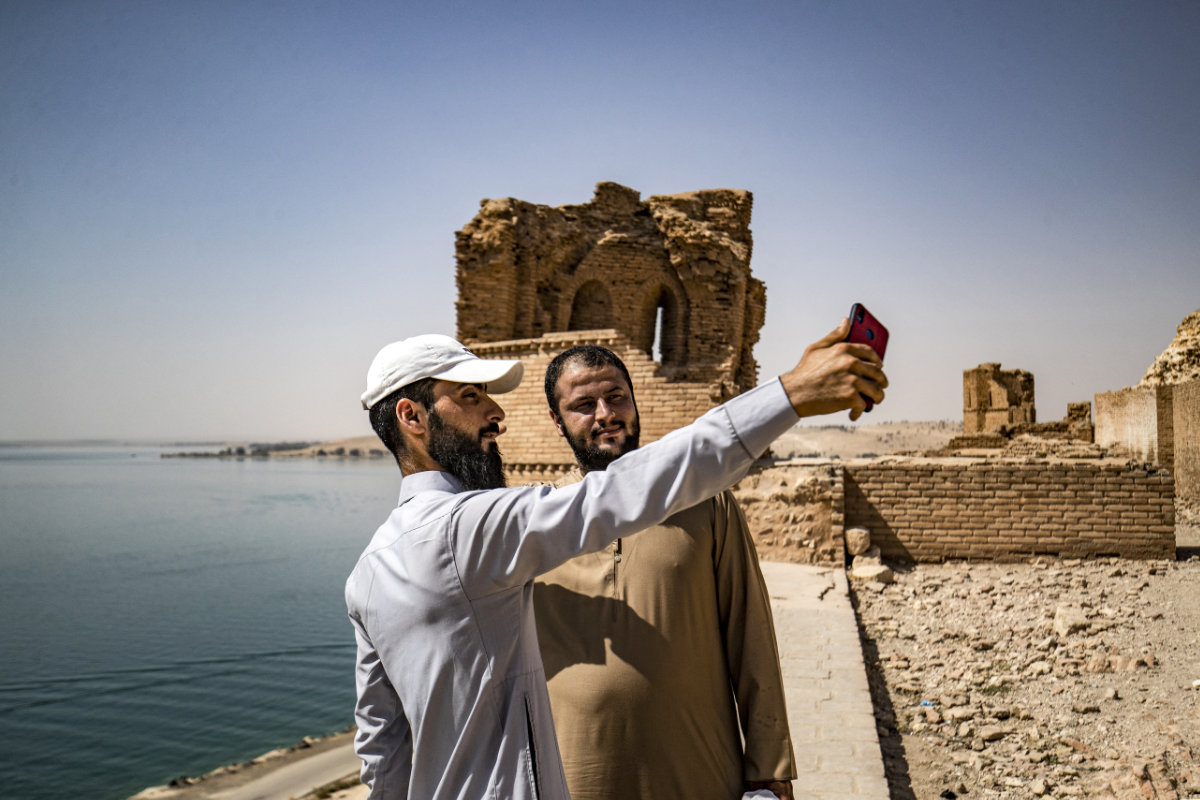
Jaabar Citadel, the ancient lake-side fortress once used by jihadists to launch attacks, is slowly regaining its status as a top cultural destination. (AFP)
“For a country in which it is practically impossible to establish a volunteer charity initiative without considerable — often wholly prohibitive — interference from the central state, it is improbable that a Syrian travel agency has been able to secure the requisite licensing, permissions and access without some form of state intervention,” said Bayley.
Such travel agencies are carefully vetted by state security services, he said, and it is likely they are made well aware of the consequences for their business if their tours result in any bad publicity for the regime.
“Backpacker Ben” said he was accompanied throughout his visit to Syria by a “fixer” who guided him around the country. He admitted feeling “slightly restricted” as a result. Such guides appear to stay at the same hotels as their tour parties.
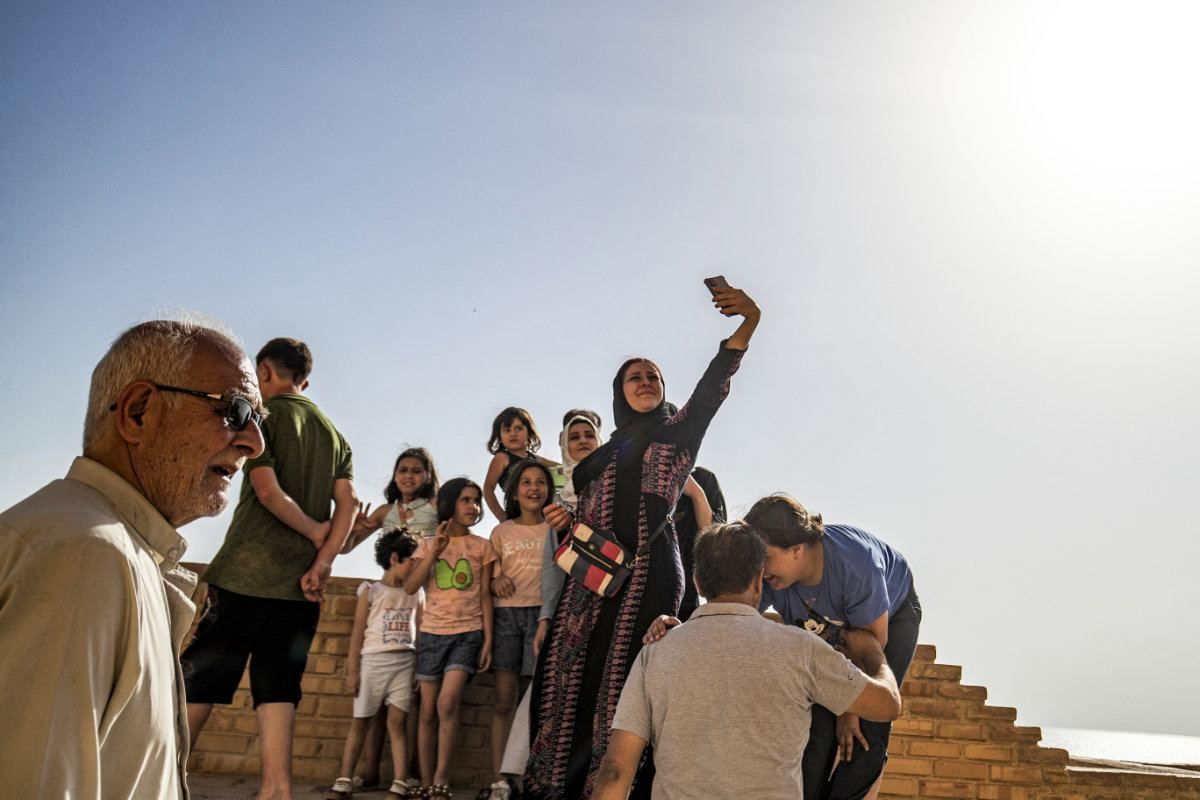
A family visits the ruins of the Jaabar Citadel in Syria's Raqqa province on June 3, 2022. The ancient lake-side fortress is attracting visitors from across war-torn Syria. (AFP)
Hesham Nasri, the marketing director at Syrian travel agency Golden Team, told Arab news that tour operators typically take care of the entire process for foreign clients, from obtaining visas to creating itineraries.
He said the agency applies to government authorities for all required security clearances on behalf of clients who want to visit Syria, and the permits that allow the tourists and their guides to travel around the country.
Although Nasri said no conditions are attached to the security-clearance process, Syrian immigration authorities have been known to reject the visa applications of certain nationalities, notably American citizens.

What the gullible travel bloggers are not saying is the danger that awaits visitors in much of war-ravaged Syria. (AFP file)
Monitors say that by facilitating such stage-managed visits for often ill-informed and gullible travel bloggers, the regime is able to peddle its propaganda in cyberspace and bypass the professional rigour of conventional journalism.
“In future, I hope those with an online presence are mindful as to the consequences of their actions in such a politically sensitive place,” said Bayley.
“Regardless of how much one knows about the conflict, it is abundantly clear that a war is still being fought and that the wounds from that conflict are still very much open for many millions of people.”


































